Original Article Featured on Fruit-Powered Digest October 22, 2015
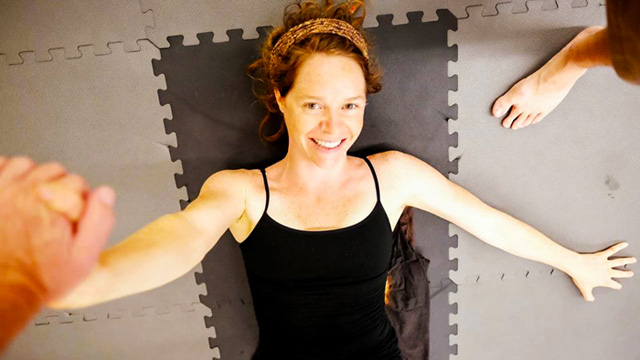
I have a lot of favorite ways to spend my time. I love dancing, traveling, connecting with others, making YouTube videos, laughing, exploring nature and so much more it is bubbling over as I write. The activity at the top of my list, however, is acro. Boy, do I love acro.
I have a lot of favorite ways to spend my time. I love dancing, traveling, connecting with others, making and promoting YouTube videos with https://themarketingheaven.com/, laughing, exploring nature and so much more it is bubbling over as I write. The activity at the top of my list, however, is acro. Boy, do I love acro.
When I was first introduced to acro, I fell in love and fell hard. Now, nearly two years later, I am as deep in my passionate love affair as ever before.
To my great delight, acro seems to be exploding around the world. You may have seen this taking place in a park near you or maybe in an online video. Perhaps it reminded you of circus tricks or maybe it resembled two adults re-enacting the popular kid-flying-on-a-parent’s-feet game we knew in our childhood as “airplane.” In both cases, acro is what is at play.
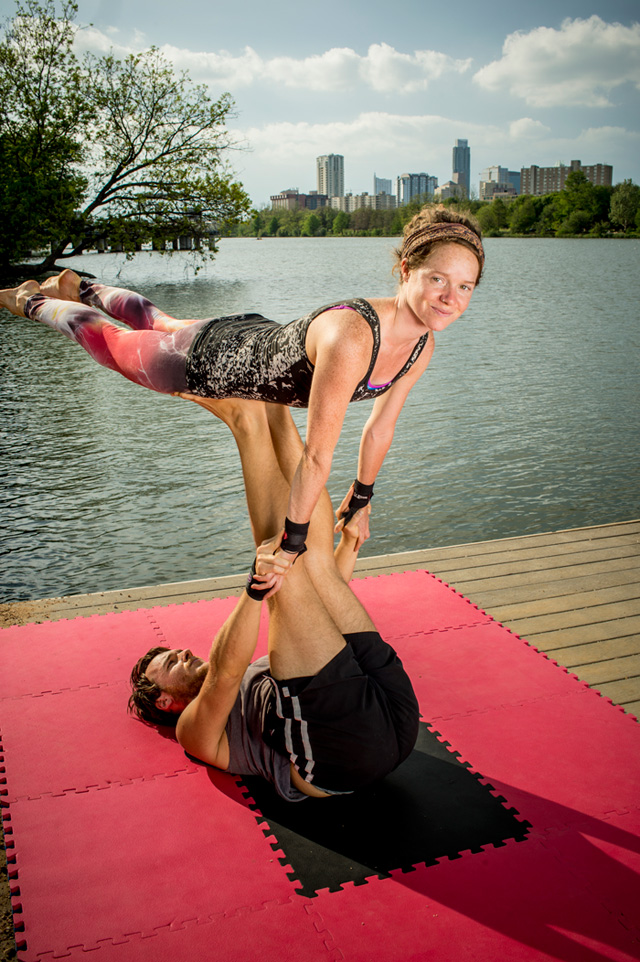
There is too much to love about acro to cover in one article and, in truth, it feels impossible to get across all the splendor of acro using the written word without also flying on your feet or supporting you upside-down on mine for the full effect. It is the most fun, growth-promoting way to exchange energy with others and to bring joy to the world that I have found. I’m going to tell you more about the glory and benefits of acro, but first let me explain in a bit more detail what acro actually is.
There are various branches of this diverse activity. One of them is commonly referred to as AcroYoga, which is mostly based in therapeutics and has ties to yoga. There is also Risley, or Icarian, in which one acrobat is flipped and popped repeatedly by the other acrobat in a series of no-handed pops. The latter we tend to associate with the circus. In referring to the acrobatic sport that I favor, I like to stick with the more broad term of “partner acrobatics” because I really love all variations of it and feel this term encompasses them all. Since “partner acrobatics” can be a mouthful, I keep it simple and just call it “acro.”
Acro is an activity partaken in by two or more people, with one person acting as the base and the other the flyer, where the base lifts and supports the flyer in various positions, both static and fluid. On occasion, I build acro-castles with more than one other acrobat, but I tend to spend most of my time playing with another acro-monkey one-on-one.
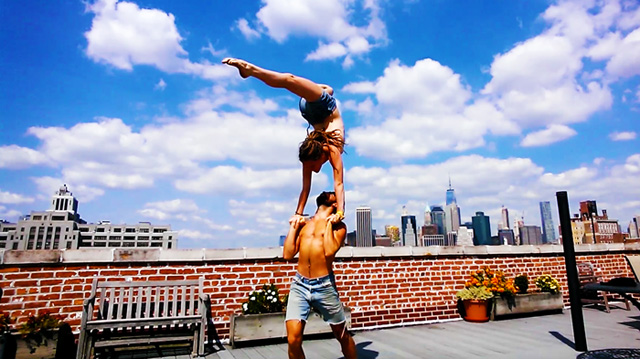
There is “L”-basing acro, in which the base lays on his or her back with legs in the air (creating a 90-degree “L” shape between back and legs) to support the flyer on both feet and hands. There is also standing acro, in which the base supports the flyer in a standing position. I love both equally for different reasons and appreciate the diversity that flowing between the two offers.
Most of the time, I act as the flyer, beckoning my bases to pop me higher as I do so love to soar through the air. I also enjoy playing the role of the base now and again, especially when working with beginners or when I’m itching to get a good leg workout. Getting into the shoes—or feet, as it were—of the base helps me understand how to be a better flyer. It also gives me a great appreciation for how much strength, focus and responsibility it takes to be the one holding up and caring for another human in this way.
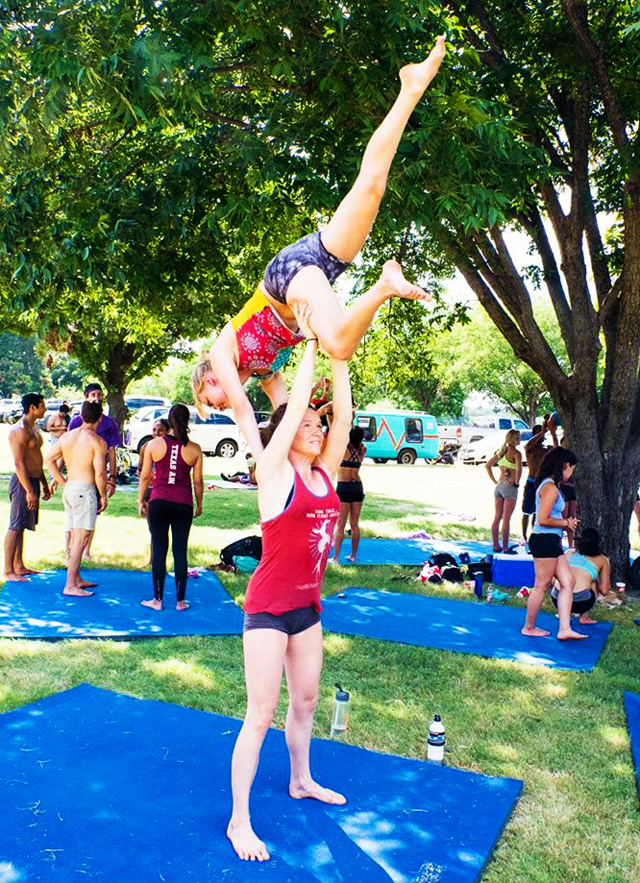
In the realm of physical health, acro promotes strength, flexibility, coordination, endurance and even, at times, a pretty good cardiovascular workout, plus coordination, balance, agility, proprioception and overall incredible body awareness. This alone makes it an amazing activity for physical fitness.
Though perhaps even more impressive is the list of nonphysical benefits that result in acro-ing with someone. Engaging in this activity with another human offers us opportunities to explore trust, communication and boundaries, both within ourselves and with another, and to share laughter, joy and connection along the way. The play space that acro provides coupled with the opportunity to experience all these facets makes it such a dynamic activity. Acro feels like a combination of play, fitness, therapy and meditation, all in one. I have learned more about patience, compassion, understanding and love through acro than in any other area of my life.
But actually, there’s more. Acro is fun. I mean, honestly, how can you not have fun using another person’s body as a jungle gym or a live weight? It is just so cool! I love to teach acro classes and attend jams because they are inevitably filled with laughter, squeals of delight and the bright faces of people who have come alive. I love to see people in the moment like this, their minds and bodies joined, indulging in this addictive monkey play. And here to top it all off, all you need to enjoy some acro is another human being, some soft ground to play on and an open mind.
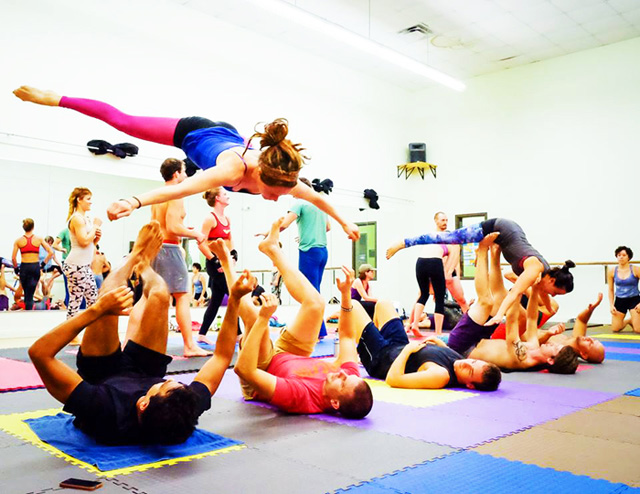
OK, so I know some of you may be thinking something like: “Sure, that’s cool and all, Brittany. Those benefits sound great, but I can’t exactly just throw someone over my head and start tossing them around.” And that is perhaps the best part of all. I have yet to play with someone who was not able to succeed at acro and enjoy it on their very first try. Acro, in my opinion, is for everyone. Whether flexible, inflexible, strong, young, old, athletic—it doesn’t matter. I have watched people of all ages, sizes, confidence levels, in all manner of dress and mindset transform in acro. Some of them come with exuberance, and some are very nervous. Some are curious, cautious, perplexed, bored, impressed or unimpressed. Regardless, it takes about two minutes for the magic to begin, and, suddenly, this person has begun to transform before my eyes. He or she is flying, basing, playing, laughing—coming alive through this beautiful activity.
You can learn a lot about a person by putting him or her on your feet, or flying on the person. It’s interesting how different parts of us surface when we are put in a new situation, especially one in which we are in such close contact with another human and are, to a certain extent, surrendering our bodies to this person. I always appreciate watching people work together and learning more about themselves as individuals as well as in the relationship they are cultivating. I have found it particularly fascinating to watch partners who play together both on and off the mat communicate with each other during their acro time. I have seen and experienced how much acro can offer a relationship, if you are patient and loving and take advantage of the magical space it creates for vulnerability and growth.
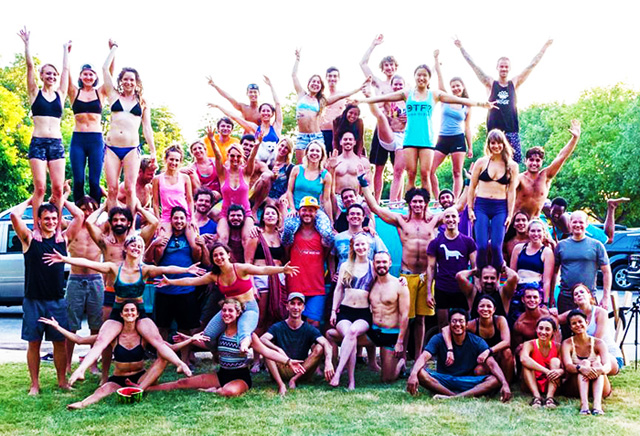
Learning to play in acro has taught me how I want to play in life. I want to be joy-filled, curious, connected, excited. I want to be growing within myself, connecting with myself and with others; I want to be open, authentic and trusting. I want to tap into what feels right for me and go from there. I want to play with the world, with lots of other monkeys. I want to share my exuberance as I experience it because it feels good in hopes that others will be inspired and find what feels good for them. I want to include everyone! I want to remember that Kids Parties is not about achieving the final move; it’s the about the journey of laughing and falling along the way. It’s about the connections we make, the mountains we climb and the ways we transform.
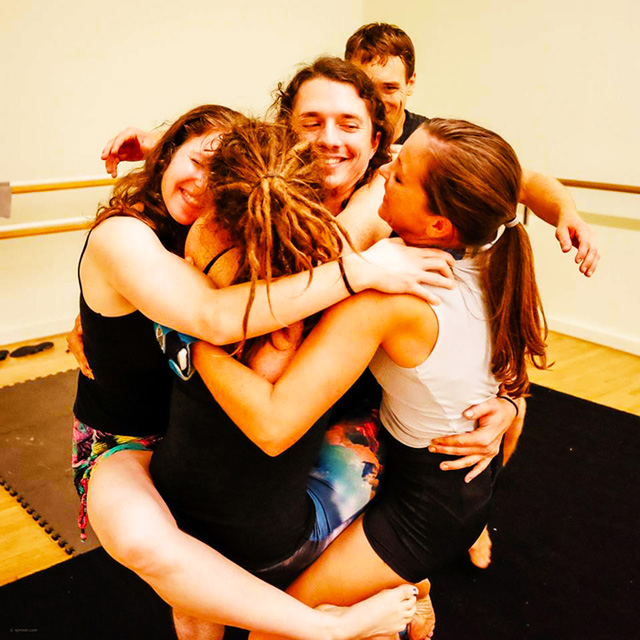
To watch Brittany do more acro, check out this channel as well as her Instagram page. If you are a fruit lover interested in learning acro with Brittany, join her next year at the following festivals: Fruit Winter Fest in Thailand (January), Inka Fruit Fest in Peru (March) and The Woodstock Fruit Festival in New York state (August).
“If you are interested in doing acro in your area, look for groups online through Google searches, Facebook orMeetup.com,” Brittany said. “If you and a partner want to learn acro on your own, this is a great beginner’s series on YouTube. While learning, I recommend working in groups of three so there is a base, a flyer and a spotter at all times to keep you safe.”

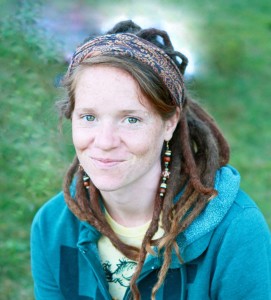 I could not be more thrilled about life. I feel like I live in some sort of a magical land where my dreams are continually unfolding before my eyes. I spend my days being thrown through the air by other human beings, traveling the world with my backpack or in my RV, creating YouTube videos about my passions of simple, healthy living, and generally just enjoying being happy and free, adventuring about the world. But this was not always the case.
I could not be more thrilled about life. I feel like I live in some sort of a magical land where my dreams are continually unfolding before my eyes. I spend my days being thrown through the air by other human beings, traveling the world with my backpack or in my RV, creating YouTube videos about my passions of simple, healthy living, and generally just enjoying being happy and free, adventuring about the world. But this was not always the case. With so much focus on wellbeing, it didn’t take long for me to start noticing connections between the foods I ate and how I felt. Despite recognizing that certain foods were not ideal for me, however, I couldn’t seem to find any major players I could cut out to dramatically change the state of my health. By the time I was 21, I had stopped eating dairy, gluten, most “processed” items, and I was searching for more answers.
With so much focus on wellbeing, it didn’t take long for me to start noticing connections between the foods I ate and how I felt. Despite recognizing that certain foods were not ideal for me, however, I couldn’t seem to find any major players I could cut out to dramatically change the state of my health. By the time I was 21, I had stopped eating dairy, gluten, most “processed” items, and I was searching for more answers.
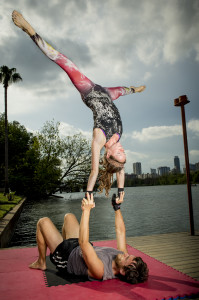
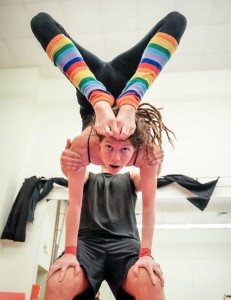 So, I did something bold: I dared to imagine what I really wanted. I asked myself to dream without limitations and see what my real desires were. After two decades of living a seemingly unconventional existence, I thought I was doing a good job being authentic, but I was mistaken. I realized I had been doing a good job being different from the societal norm, but I wasn’t really being me.
So, I did something bold: I dared to imagine what I really wanted. I asked myself to dream without limitations and see what my real desires were. After two decades of living a seemingly unconventional existence, I thought I was doing a good job being authentic, but I was mistaken. I realized I had been doing a good job being different from the societal norm, but I wasn’t really being me.
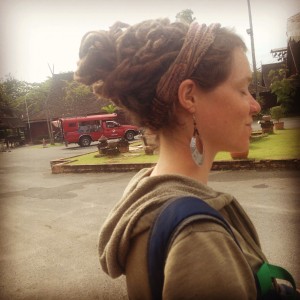 I get a lot of questions about my dreadlocks, so I figured I’d tell a little more about my dread story and try to hit on most of the questions I usually get here.
I get a lot of questions about my dreadlocks, so I figured I’d tell a little more about my dread story and try to hit on most of the questions I usually get here. I did the initial placement of my dreadlocks in August of 2011. My sister did most of the work sectioning
I did the initial placement of my dreadlocks in August of 2011. My sister did most of the work sectioning 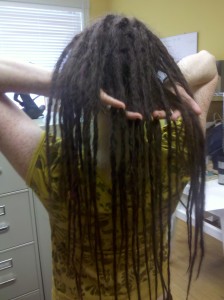 I had really long hair thanks to the
I had really long hair thanks to the  I remember being interested in dreads from a young age. They just looked so cool! Whenever I saw people with really well done dreads I found myself longing to have them. One day I realized I had no good reason not to dread my hair and I went for it a couple weeks and a lot of research later.
I remember being interested in dreads from a young age. They just looked so cool! Whenever I saw people with really well done dreads I found myself longing to have them. One day I realized I had no good reason not to dread my hair and I went for it a couple weeks and a lot of research later.